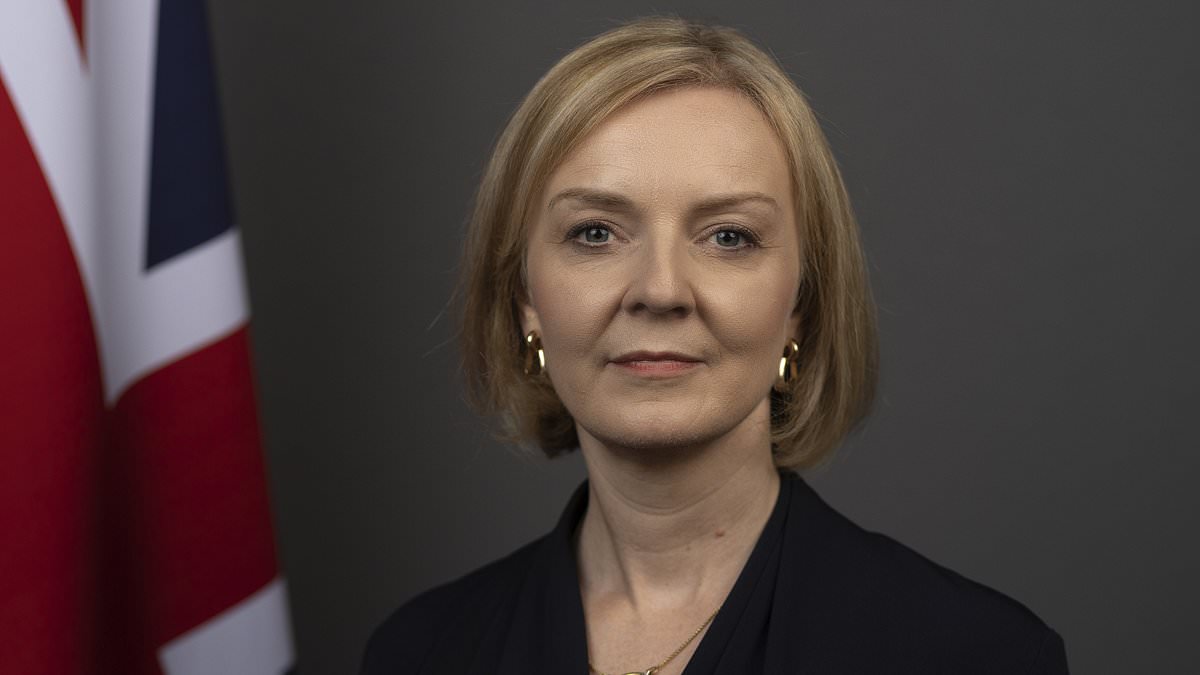LIZ TRUSS: By beefing up the Office for Budget Responsibility, Starmer and Reeves would put up a barrier to prosperity
- READ MORE: Truss calls for ban on sale of new petrol cars by 2030 to be delayed
Margaret Thatcher once famously said: ‘The problem with socialism is that you always end up running out of other people’s money.’ Reflecting the historic truth of that observation, profligacy has led every Labour government since the war into crisis.
Sir Keir Starmer and his Shadow Chancellor Rachel Reeves claim it will be different if they win the next election. They plan to give themselves a new veneer of fiscal rectitude by beefing up the Office for Budget Responsibility (OBR).
As they set out yesterday, their scheme would give the quango new statutory powers to assess the Government’s economic policies and publish independent forecasts of their impact. More than a watchdog, under Labour the OBR would become a key influencer of the country’s direction.
That is precisely why this proposal is so depressing. In its embrace of regulation and more control for unaccountable bureaucrats, it encapsulates what is going wrong with the British economy, where growth is too low, taxation too high and the state too large.
The OBR is one of the props of the current economic consensus, a brake on competitiveness and a barrier to prosperity.
LIZ TRUSS: The OBR’s and Treasury’s approach to economics underestimates the impact of raising taxes and piling on red tape
Labour leader Sir Keir Starmer and shadow chancellor Rachel Reeves during a visit to the London Stock Exchange Group, to outline the party’s plans to bring growth and stability back to Britain’s economy
I experienced this directly for myself when I became Prime Minister with a clear mandate to focus on growth through measures such as tax cuts, deregulation and supply side reforms.
This was what the Mini-Budget that Chancellor Kwasi Kwarteng introduced last September was about. But we had underestimated the determination of the establishment in Whitehall to fight any challenge to the established orthodoxy.
READ MORE: Is this Sadiq Khan’s next tax on motorists? New signs approved for Blackwall and Silvertown Tunnels in London show a £4 toll for drivers from 2025
The OBR’s and Treasury’s approach to economics underestimates the impact of raising taxes and piling on red tape.
There were complaints that the OBR had not been asked to produce a forecast. But there was no reason why it should have been. The OBR did not produce an official analysis when Rishi Sunak introduced his vast Furlough scheme at the height of the Covid pandemic.
Moreover the core purpose of the OBR is to produce twice-yearly forecasts of whether the Government is on track to meet its fiscal targets. We weren’t due to set our spending plans until November so it would have been neither appropriate nor feasible for a report to have been produced in September.
The storm that followed in the wake of the Mini-Budget was in much part caused by the failure of the Bank of England to raise interest rates enough or regulate pension funds.
The OBR added to the turmoil by leaking its calculation that there was a £70billion hole in our plan — forcing us to reverse our plans to freeze Corporation Tax, which would have attracted business and generated growth. This was a ferocious blow that helped to destroy both the Mini-Budget and my premiership.
Yet the OBR estimate proved to be hopelessly wrong — like so many OBR predictions and those from the Bank of England. Too often swayed by consensus opinion and overly reliant on limited sources of information, both bodies have a dismal recent record on forecasts.
But Starmer and Reeves favour the OBR because it shares the fashionable groupthink in support of the big state and record public expenditure. The quango never shows the same antipathy towards spending increases as it does towards tax cuts.
But that just illustrates how badly the OBR has lost its way. The body was established by the Tory-Liberal Democrat Coalition to provide credibility after the crash, but it has morphed into another arm of the sprawling state machine.
As Douglas McWilliams, the Co-Chair of the Growth Commission who was consulted about its creation, has put it: ‘The OBR has continued to rely on the same types of academic and public sector economists who failed to foresee the crash.’
The creeping takeover of the public realm by unaccountable quangos and regulators is a major threat to our democracy. We can choose who our politicians are through the ballot box but no one elects the head of the OBR.
We live in a land where there is insufficient accountability over the Bank of England’s monetary policy and if Labour has its way, fiscal policy would be even more straitjacketed by the OBR.
That would only reinforce the progressive stranglehold on Britain, which has seen state spending reach its highest level in 50 years, taxes at their heaviest since World War Two and debt increase to £2.5trillion. Mrs Thatcher wanted to ‘roll back the frontiers of the state.’
With the OBR in command, they would keep rolling forward.
Source: Read Full Article


